For many individuals, addiction recovery is a life-changing journey that requires dedication, support, and a commitment to long-term well-being. While focusing on healing is crucial, navigating professional life during recovery can present a unique set of challenges. Juggling work demands with the early stages of recovery can feel overwhelming, but it is absolutely possible to thrive in both areas.
This article explores key strategies for managing work and career while focusing on recovery. We’ll delve into effective communication with employers, stress management techniques, and resources available to support you on this journey.
Understanding Your Rights and Employer Support
The first step is familiarizing yourself with your rights under the Americans with Disabilities Act (ADA). The ADA protects qualified individuals with disabilities, including substance use disorders, from discrimination in the workplace. This includes the right to request reasonable accommodations to support your recovery.
Examples of reasonable accommodations may include:
- Flexible scheduling for therapy appointments or support group meetings (offered by many facilities like Relief Recovery Center [rehab programs])
- A quiet workspace to minimize distractions
- A leave of absence for inpatient treatment
It’s important to note:
- You are not obligated to disclose your diagnosis to your employer unless you require accommodations.
- When requesting accommodations, focus on the specific limitations your addiction creates and the specific accommodations needed to perform your job effectively.
For detailed information on the ADA and your workplace rights, visit the Equal Employment Opportunity Commission (EEOC) website https://www.eeoc.gov/.
Open and Honest Communication is Key
Transparency with your employer, when appropriate, can be incredibly helpful. Consider having an honest conversation with a supervisor you trust, particularly if your recovery journey requires schedule adjustments or short-term absences.
Tips for a successful conversation:
- Focus on solutions: Outline the specific accommodations you need and how they will benefit your work performance.
- Be prepared: Gather documentation from your treatment provider if needed.
- Maintain confidentiality: You are not obligated to disclose details you’re not comfortable with.
- Express gratitude: Show appreciation for your employer’s understanding and support.
Remember: Building trust and open communication fosters a more supportive work environment for your recovery.
Prioritizing Self-Care and Maintaining Boundaries
Self-care is an essential pillar of addiction recovery. This includes practices that promote your physical and mental well-being, allowing you to manage stress and stay focused at work.
Here are some self-care strategies to integrate into your routine:
- Develop a healthy sleep schedule: Adequate sleep is crucial for stress management and cognitive function.
- Maintain a balanced diet: Eating nutritious meals provides the energy you need to excel at work.
- Engage in regular exercise: Physical activity is a powerful tool for managing stress and improving mood.
- Practice relaxation techniques: Consider activities like meditation, yoga, or deep breathing exercises to de-stress after work.
Setting boundaries is equally important. This means establishing clear limits between your work life and your recovery efforts.
Tips for establishing boundaries:
- Leave work at work: Avoid checking work emails or taking calls outside of work hours unless absolutely necessary.
- Schedule time for recovery activities: Block out time in your calendar for therapy appointments, support group meetings, or other recovery activities.
- Learn to say no: Don’t be afraid to politely decline additional workload if it would compromise your well-being.
Identifying and Managing Stressors
The workplace can be a significant source of stress, and managing that stress is crucial for your recovery journey.
Common workplace stressors:
- Tight deadlines
- Heavy workloads
- Difficult colleagues
- Unrealistic expectations
Strategies for managing stress:
- Time management: Develop effective organizational skills to prioritize tasks and avoid feeling overwhelmed.
- Delegation: Learn to delegate tasks appropriately whenever possible.
- Communication: Address concerns with your supervisor or colleagues proactively to prevent frustration.
- Take breaks: Schedule short breaks throughout the day to de-stress and recharge.
Consider relaxation techniques: Techniques like deep breathing, meditation, or progressive muscle relaxation can be practiced throughout the day to manage stress in the moment.
Building a Support System at Work
A strong support system is vital for long-term recovery. While you may not disclose your addiction to everyone at work, consider identifying a trusted colleague you can confide in for general support. This person doesn’t need to know the specifics of your recovery journey, but having someone to share challenges and celebrate successes with can be incredibly beneficial.
Here are some qualities to look for in a potential work-based confidante:
- Trustworthiness: Choose someone you feel comfortable being open and honest with.
- Positive attitude: Look for someone who is supportive and encouraging.
- Discretion: This person should be someone who respects your privacy.
Building a connection with a recovery sponsor outside of work is also crucial. A sponsor is someone further along in their own recovery journey who can offer guidance, encouragement, and accountability. Support groups, such as those offered by organizations like Alcoholics Anonymous (AA) or Narcotics Anonymous (NA), are excellent places to find sponsors and connect with others facing similar challenges (https://www.aa.org/ & https://na.org/).
Remember: Utilize the resources available through your employer-sponsored Employee Assistance Program (EAP). EAPs often offer confidential counseling, support groups, and referrals to addiction treatment specialists. You can find more information about EAPs through the Society for Human Resource Management (SHRM) website https://www.shrm.org/.
Maintaining Recovery While Traveling for Work
Business travel can disrupt your recovery routine. Here are some tips to stay on track:
- Pack essentials: Bring recovery literature, meditation apps, or other tools that support your well-being.
- Maintain a sleep schedule: Adjust gradually to time zone changes to minimize sleep disruptions.
- Plan healthy meals: Research healthy food options available at your destination or pack healthy snacks.
- Schedule recovery activities: Find out if there are local support group meetings or recovery-friendly gyms at your destination.
- Communicate with your support system: Stay connected with your sponsor, therapist, or recovery group via phone or video calls.
Recognizing and Avoiding Relapse Triggers
Early recovery is a vulnerable time, and it’s important to identify and avoid situations that could trigger a relapse.
Common workplace relapse triggers:
- Stressful workloads: Feeling overwhelmed can lead to cravings or a desire to escape.
- Social events with alcohol or drugs: Workplace gatherings involving substances can be tempting.
- Negative colleagues: Difficult relationships can contribute to stress and cravings.
Strategies for avoiding triggers:
- Develop a relapse prevention plan: Work with your therapist to identify your triggers and create strategies to cope with them effectively.
- Practice assertive communication: Learn to say no to situations that make you feel uncomfortable.
- Develop healthy coping mechanisms: Replace unhealthy coping mechanisms with healthy activities like exercise or spending time with supportive loved ones.
Building a Fulfilling Career in Recovery
Recovery is a lifelong journey, but it doesn’t have to limit your professional success. By prioritizing self-care, establishing boundaries, and building a strong support system, you can effectively manage work and career while focusing on your recovery. Remember, many successful professionals have navigated addiction recovery. With dedication, self-compassion, and the right support network, you can achieve your goals and thrive in both your professional and personal life.
Additional Resources:
- Relief Recovery Centers: wewantrelief.com
- National Institute on Drug Abuse: https://www.nih.gov/about-nih/what-we-do/nih-almanac/national-institute-drug-abuse-nida
- Substance Abuse and Mental Health Services Administration (SAMHSA): https://www.samhsa.gov/



